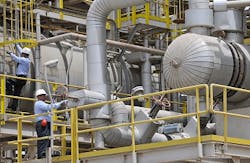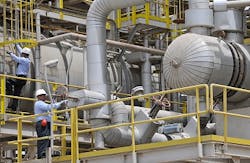Mobile desalination units help Bahrain Petroleum Company meet boiler feedwater demands
MANAMA, Bahrain – The Bahrain Petroleum Company (Bapco) has eliminated the need to boost its boiler feedwater requirements at its Awali refinery by tanker trucks after taking delivery of mobile water technology from GE.
Previously, the limited in-house distillate water production from thedesalination units prompted Bapco to import water using tank trucks to fill up the shortage, causing gridlock on refinery roads.
For the project, GE Water & Process Technologies provided Bapco a turnkey operations and maintenance solution with a total of 13 mobile water units.
This included six mobile seawater multimedia filter containers, five mobile seawater reverse osmosis containers, two mobile brackish water reverse osmosis containers and four diesel-operated electrical generators.
Bahrain is one of the most water-stressed countries in the world and will continue to be through at least 2040, according to the World Resources Institute.
Bapco refines more than 260,000 barrels per day of crude oil, exporting throughout the Middle East, India, the Far East, Southeast Asia and Africa.
“GE’s mobile water solutions enabled Bapco to convert seawater into high-purity boiler feedwater for refinery use," said Yousif Ahmed, acting manager, power and utilities, Bapco. “Availing mobile water solutions ensure a continual water supply instead of relying on tank truck deliveries.”
GE’s industrial water business isexpected to be rebranded as SUEZ Water Technologies & Solutions in the coming months.
###
Read more
Suez to supply Petrobas with mobile desalination units in Brazil
Water reuse in Bahrain’s oil and gas industry
CH2M lauded for noteworthy wastewater treatment plant projects

